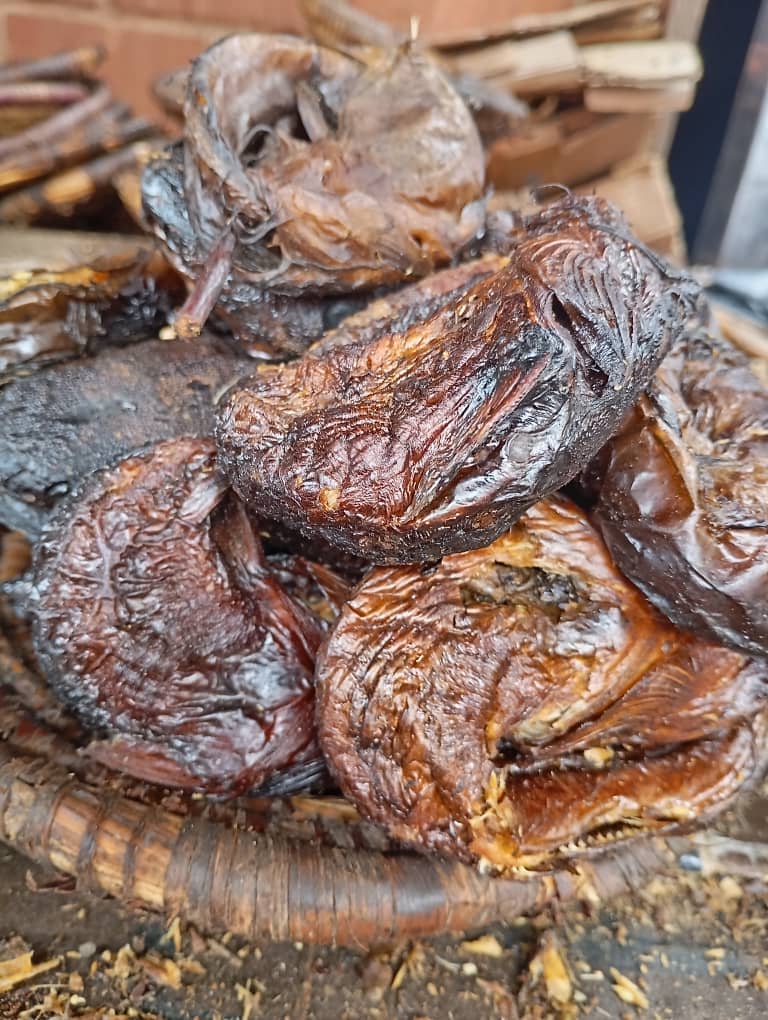Our local Nigerian fishes are organically/naturally farmed in our vast network of rivers, lakes, and coastal waters, which is home to a rich diversity of fish species that play a significant role in the country’s ecology, economy, and culture. At Ola-Hola, we sure the sustainability of our foodstuff products in their natural, and organic state with no artificial preservative or chemical additives. Our local assorted fishes are oven-dried/smoked to preserve its natural taste and flavour; hygienically, naturally processed without preservatives or additives, and vacuum-sealed to ensure longer shelf life. Local Nigerian fish varieties offer a wealth of nutritional and health benefits. They are excellent sources of protein, omega-3 fatty acids, and essential micronutrients like iron, zinc, and iodine, which are crucial for various bodily functions and overall well-being
Common fish names in Nigeria include Panla (Hake), Tilapia, Catfish, Mackerel (Titus), and Stockfish. Other names include Abo, Asa, and Croaker fish. Freshwater fish have specific local names, such as Eja-Epiya for Tilapia in Yoruba






Local Nigerian fish varieties offer a wealth of nutritional and health benefits.They are excellent sources of protein, omega-3 fatty acids, and essential micronutrients like iron, zinc, and iodine, which are crucial for various bodily functions and overall well-being.
Here’s a more detailed look at the benefits:
Nutritional Value:
- High-quality Protein:Fish provides lean protein, vital for muscle repair and growth.
- Omega-3 Fatty Acids:These essential fats, particularly DHA and EPA, are linked to improved heart health, brain function, and reduced inflammation.
- Micronutrients:Fish are rich in minerals like iron, zinc, and iodine, which are essential for various bodily functions, including brain development, red blood cell production, and thyroid function.
- Vitamins:Fish, especially fatty varieties, are good sources of Vitamin D and B vitamins.
Health Benefits:
- Heart Health:Omega-3s in fish help reduce the risk of heart disease by lowering blood pressure, triglycerides, and inflammation.
- Brain Health:Omega-3s, particularly DHA, are crucial for brain development and function, potentially improving cognitive abilities and reducing the risk of depression.
- Vision:Fish consumption may help protect against vision loss and age-related macular degeneration.
- Reduced Risk of Chronic Diseases:Studies suggest that regular fish consumption may lower the risk of developing chronic diseases like type 2 diabetes and some cancers.
- Bone Health:Fish like stockfish (panla) provides calcium and phosphorus, essential for strong bones and teeth.
Specific Fish Varieties in Nigeria:
- Panla Fish (Hake): A good source of protein, omega-3s, and vitamin D.
- Catfish: Rich in omega-3s, particularly DHA and EPA, which are important for heart and brain health.
- Tilapia: A good source of protein and minerals like iron and zinc.
- Sawa Fish (Erin fish): Another good source of vitamin D, protein, and omega-3s.
- Stockfish: High in protein, calcium, and phosphorus.
Important Considerations:
- Mercury Levels:While generally beneficial, some fish may contain higher levels of mercury. It’s advisable to consume a variety of fish and choose lower-mercury options.
- Sustainability:It’s important to consider the sustainability of fish stocks and choose responsibly sourced options.
Nigeria, with its vast network of rivers, lakes, and coastal waters, is home to a rich diversity of fish species that play a significant role in the country’s ecology, economy, and culture. From the bustling markets in Lagos to the serene fishing villages along the Niger River, local Nigerian fishes are a vital source of protein and livelihood for millions. In this blog post, we will dive into some of the most common and culturally significant fish species found in Nigeria.
1. Tilapia (Oreochromis niloticus)
Tilapia is arguably the most popular fish in Nigeria, known for its mild flavor and versatility in cooking. It thrives in both freshwater and brackish environments, making it abundant in rivers, lakes, and fish farms across the country. Tilapia is often grilled, fried, or used in stews and is a staple in Nigerian cuisine.
2. Catfish (Clarias gariepinus)
The Nigerian catfish is another highly favored species, particularly for its firm texture and distinctive taste. Catfish farming is a booming industry in Nigeria due to its fast growth rate and high market demand. Traditional dishes like Catfish Pepper Soup highlight the delicate flavor of this fish, making it a household favorite.
3. Mackerel (Scomber scombrus)
Found along Nigeria’s Atlantic coastline, the mackerel is prized for its rich, oily flesh packed with omega-3 fatty acids. It is commonly smoked, grilled, or used in soups, and is an important catch for coastal fishing communities.
4. Niger River Perch (Lates niloticus)
Also known as the Nile perch, this large freshwater fish is native to the Niger River system. It is highly valued for its firm white meat and is often grilled or fried. Due to its size, it is also a significant source of income for local fishermen.
5. African Butterfish (Schilbe mystus)
Commonly called “Butterfish” because of its smooth texture, this species is often caught in the rivers and lakes of Nigeria. It is usually smoked or fried and features prominently in many traditional dishes.
The Importance of Sustainable Fishing
While these fishes contribute immensely to Nigeria’s food security and economy, overfishing and environmental degradation threaten their populations. It is crucial to promote sustainable fishing practices and aquaculture development to preserve these valuable resources for future generations.
Conclusion
Local Nigerian fishes are more than just a source of nourishment; they are an integral part of Nigeria’s cultural heritage and livelihoods. By appreciating and conserving these species, Nigerians can ensure that future generations continue to enjoy the rich aquatic bounty their country has to offer.
Whether you are a food lover, an environmentalist, or simply curious about Nigeria’s natural resources, exploring the world of local Nigerian fishes offers a fascinating glimpse into the heart of the nation’s biodiversity and culinary traditions.
